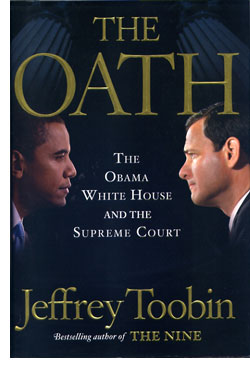 |
 |

Jeffrey Toobin
The Oath: The Obama White House and the Supreme Court
Doubleday / Random House
US Hardcover First Edition
ISBN 978-0-385-52720-0
Publication Date:09-18-2012
328 Pages; $25.95
Date Reviewed: 10-18-2012
Reviewed by: Rick Kleffel © 2012
Index:
Non-Fiction
When Chief Justice John Roberts administered the Oath of the Office of the Presidency to Barack Obama on January 21, 2009, Obama got a bit ahead of him, and apparently flustered the usually serene Roberts. They managed to blow the Oath, to the degree that they quietly re-did it. It was just a hint of what was to come, and Jeffrey Toobin uses it as to begin his second non-fiction legal thriller about the Supreme Court, 'The Oath: The Obama White House and the Supreme Court.' Early on, Toobin quotes Byron White, a Justice who said that, "When you change one justice, you change the entire court." In 'The Oath,' Toobin follows the characters in the current Supreme Court to demonstrate the truth of this statement as he crafts a story of immense implications and subtle rivalries that play out on the national stage.
While it's not necessary to have read 'The Nine' before picking up 'The Oath,' those who have will be rewarded with a richly written, well-wrought saga of political change spanning decades. 'The Oath' does capture all the essential bits of 'The Nine' necessary to carry the story forward into the recent past and the present, leading up to two very different decisions; Citizens United and National Federation of Independent Businesses v. Sibelius, the Affordable Health Care Act ruling. Toobin takes readers through an intense, nerve-wracking bout of change, stasis and characters on the cusp of a power struggle between two factions of a deeply-divided America.
At the forefront are the two men on the cover of the book; President Barack Obama and Chief Justice John Roberts. As Toobin points out, the men have much in common, yet they are very different in terms of governing philosophy. His portrait of Roberts is page-turning stuff, full of pithy, important observations written in entertainingly crisp prose. We meet a man who practiced the oath so many times his wife told him that their dog thought he was President; a man who cleaves to practicalities where others immerse themselves in theory. In short, Toobin creates a complicated portrait of a man who managed to lead the court to two decisions that seem almost diametrically opposed.
The details matter, and Toobin knows how many to offer and how to present them in a manner that ensures we never feel overwhelmed. This is especially true in his characterization of Barack Obama. It's not like Obama is underexposed. But Toobin captures those parts of his character and past that suggest not just the thinking behind his picks for the Supreme Court, but as well, his confrontations with the court. We meet a rather different President than the man who makes such inspirational speeches, and in fact, we meet the man who foundered at the first Presidential Debate — and we understand why that happened.
Given the split nature of the two major cases discussed so engagingly in this book, it is clear by the end of the book that the story of the evolution of the Supreme Court is not finished. In a sense, it never will be, and this is clear. But readers will certainly hope that Toobin himself is not done with the Court. No matter what the subject, it is clear that Toobin can write the sort of books that historians will consult in the decades that follow, and that readers can immerse themselves in at this moment. When you self-administer Jeffrey Toobin's 'The Oath,' prepare to recognize a historical moment — and hope that another arrives sooner, rather than later. Even if the consequences seem dire now, in the short and long run, well-written historical non-fiction literature helps to alleviate the malaise that history itself seems to nurture.
|
 |
|
|
 |
| |
Review Archive
All Reviews alphabetized by author.
General Fiction
Non-Genre, general fiction and literature.
Horror
Supernatural fiction, supernatural horror and non-supernatural horror.
Science Fiction
Science fiction, science fantasy, speculative fiction, alternate history.
Fantasy
Fantasy, surrealism and magic realism.
Mystery
Crime, thrillers, mystery, suspense.
Non-Fiction
Non-Fiction, True Crime, Forteana, Reference.
Poetry
|
|
 |
|




